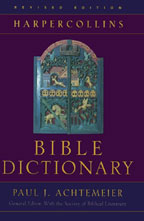Bible Study Tools: Bible Dictionaries

Making Effective Use of a Bible Dictionary in your Bible Study
Author: Henry E. Neufeld
You may also want to see our broader overview of Bible study tools or look at our Participatory Study Series of Christian pamphlets, especially those on Bible Study and the one titled Bible Study Tools.
What is a Bible Dictionary?
A Bible dictionary is basically a collection of terms used in the Bible and about the Bible along with the definitions (generally extended definitions) of what Biblical scholars mean by those terms. You may find some lists of references to where certain words or names are found in the Bible, but these will not be exhaustive as they would be in a concordance. A Bible dictionary will also usually give you some background information and archeological data. There is relatively little difference between Bible dictionaries and a Bible encyclopedias in current editions, because the Bible dictionary articles now tend to be long and to include a substantial amount of information beyond basic definition.
Some of the things you will find in a Bible dictionary are:
- Definitions of terms
- Introductory information on a book of the Bible
- Short biographies of Bible characters
- Historical background information
- Descriptions and histories of places, such as countries or cities
You will generally not find the following:
- Extended theological or doctrinal discussions, though there will be some references. For these you need a theological dictionary
- Exhaustive lists of passages containing specific words or concepts. For specific words you need a concordance, while for concepts and topics you need a topical concordance
- Extensive historical maps. There will be some maps and geographical information, but for more extended information you need a Bible atlas
- Verse by verse commentary. For this you need a Bible with study notes, a Bible handbook, or a commentary
- Devotional articles. For these you need either a devotional commentary or a Bible with devotional notes
|
|
For the purposes of this guide I'm going to use the HarperCollins Bible Dictionary as an example. This Bible dictionary is written by various members of the Society of Biblical Literature, and reflects mainstream scholarship. Many evangelical Christians will find it somewhat liberal in orientation and will prefer the New International Dictionary of the Bible. It contains much the same type of information, and this article will apply equally to using it.
|
|
|
|
More serious students, or students with more time on their hands, will want a multivolume set such as the Anchor Bible Dictionary or the Interpreter's Dictionary of the Bible.
|
|
Let's take a verse from the book of Hebrews and look at the type of information we can find using a Bible dictionary.
|
17For this reason it was necessary for him to be like his brethren in all ways, so that he could become a merciful and faithful high priest concerning divine matters {matters dealing with God} in order to cleanse the sins of the people. -- Hebrews 2:17, my translation
This translation is taken from my study guide To the Hebrews, available from Energion Publications
|
First we must select some words or concepts from this passage that we would like more information about. These terms need to be specific. If you use generic terms like "necessary" or "reason" you will not find them in a Bible dictionary. Terms that you will tend to associate with religion and the Bible are the ones that are likely to be found. You might look at definitions for these terms in an ordinary dictionary and even in a concordance with profit. In this verse, I will select the following terms:
- faithful
- merciful
- high priest
- cleanse
- sins
I have intentionally chosen some terms that will be less profitable than others.
Faithful does not occur in the HarperCollins Bible Dictionary, but in looking for it, I find that faith does. I might look at this article to see if it helps me understand what faithful means here, but more likely I will leave that to study with a concordance or to some study notes.
Merciful does not occur either, but there is a short article on mercy that appears to have some useful information. As you study you will have to determine what is worth pursuing in the time you have available. There is also a reference to the mercy-seat which cross-references to the ark. Since I know that much of Hebrews is about the tabernacle service (this is why I recommend overview reading before you start looking up details, see I Want to Study the Bible!), I will probably want to follow this link to find out just what mercy has to do with the tabernacle.
High priest is much more profitable. I am referred to the entry on priests I find nearly five columns of information, discussing the history of the priesthood, priesthood in the ancient near east, and finally, priests in the Israelite tabernacle and temple. I find a number of topics I can cross-reference to, some of which are listed at the end of the article, including worship, sacrifice, tabernacle, and temple. We're not going to follow all those leads right now, but this illustrates what we can learn about this word. When we look at our verse, we notice that there are certain characteristics being listed that are necessary for a person to become a priest and to deal with divine matters, so it would probably be helpful for us to learn what priests, and partiuclarly high priests, did.
Cleanse is not in the Bible dictionary either, but clean is, with cross-references to animals and purity. You may or may not realize that one of the elements of the laws of the Torah was clean and unclean animals, so that is probably why we have the first cross-reference. Purity, on the other hand, may well deal with the topic of our verse. Cleansing sins sounds like it might have to do with purity.
Finally, we have the word sins. Probably we could work with a dictionary definition, but on looking I find an article of a little over two columns on sin. Perhaps there is something significant to be learned about sin. One thing I notice is quite a variety of Biblical references on sin. Because the word sin will get me quite a list in a concordance (4 columns in Strong's, not to mention more entries for sinning, sinful and so forth), this article might help me on doing a Biblical study of the word sin.
So my Bible dictionary can take me through quite a lengthy study of this verse, working just with my Bible and with it.

|
But a Bible dictionary can help with a number of other things. When I read an article about the Bible and find concepts with which I'm not acquainted, such as Biblical criticism, source theory and so forth, I can look them up in a Bible dictionary as well. You may also find, however, that you want a Bible handbook to get more extensive information on that type of term.
|
Some Definitions:
I use these definitions generally in describing study materials, but since labels can be so misleading, I try to define them carefully for you. None of these labels is intended negatively. I also use "liberal", "moderate", and "conservative", and I try to let those terms reflect the maximum possible range of Biblical scholarship.
Mainstream: Materials which would be suitable for use in departments of religion at secular universities. This does not imply more or less correct in content.
Interfaith: Involving persons other than those of one faith (Christians and Jews, for example). Distinguish from interdenominational.
Interdenominational: Involving persons from more than one Christian denomination. Distinguish from interfaith.
|







